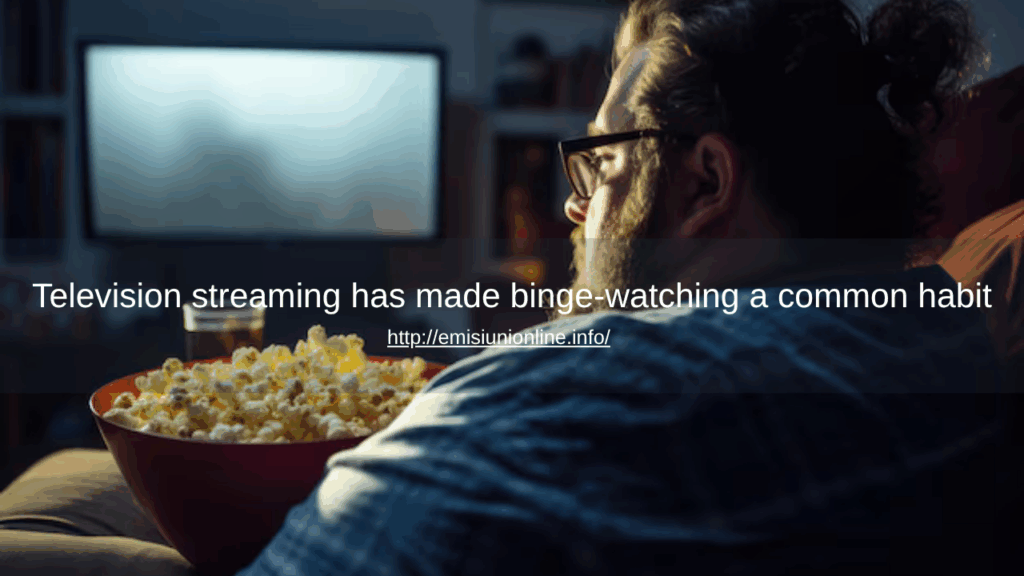Binge-Watching and Brain Health: What You Need to Know
posted by: Guest
No Comments »

Television streaming has made binge-watching a common habit. Watching multiple episodes or even an entire season in one sitting may feel relaxing or entertaining, but research shows that excessive TV consumption can have subtle yet significant effects on brain health. At Emisi Union Online, we understand that habits around screen time can influence emotional well-being, cognitive function, and recovery from addiction. By understanding the impact of binge-watching, individuals can make intentional choices that protect their mental and emotional health.
How Binge-Watching Affects the Brain
Binge-watching may seem harmless, but extended periods of passive viewing can alter brain function in several ways.
Cognitive Overload and Attention Fatigue
Rapidly switching between scenes, plotlines, or episodes can overtax the brain, leading to reduced attention span and mental fatigue. Over time, this can make it harder to focus on tasks, think critically, and retain information.
Emotional Desensitization
Continuous exposure to intense or dramatic content can dull emotional responses. Individuals may feel less sensitive to stress, empathy, or emotional cues, which can impact relationships and self-awareness.
Impact on Sleep and Memory
Late-night binge-watching disrupts circadian rhythms, reducing sleep quality. Inadequate rest affects memory consolidation and cognitive performance, making it more challenging to manage daily responsibilities or recovery goals.
Binge-Watching and Mental Health
Excessive TV consumption can also affect emotional health, particularly for those in recovery.
Increased Anxiety and Depression Risk
Extended screen time, particularly with dramatic or distressing content, can elevate stress hormones and worsen feelings of anxiety or depression.
Social Isolation
Spending long hours in front of the TV can reduce time spent with family, friends, or support groups. For individuals navigating recovery, social connection is essential for emotional resilience and long-term success.
Escape Versus Healing
While TV can be a comforting escape, relying on it to avoid emotions may delay healing or healthy coping strategies. Mindful engagement with media is critical to prevent using screen time as a substitute for emotional processing.
Practical Strategies for Mindful Viewing
Mindful TV habits allow you to enjoy entertainment without sacrificing brain health or emotional well-being.
1. Set Viewing Limits
Decide in advance how many episodes you will watch. Using a timer or a set schedule prevents unintentional binge sessions.
2. Choose Positive or Uplifting Content
Select programs that inspire, educate, or entertain without triggering stress or negative emotions. Positive content can improve mood and resilience.
3. Take Regular Breaks
Pause between episodes to stretch, move, or reflect. Short breaks reduce cognitive overload and allow your brain to process information effectively.
4. Combine TV with Healthy Activities
Balance viewing with exercise, journaling, or social interaction. These activities enhance cognitive function and emotional well-being.
5. Reflect on Emotional Impact
After watching, ask yourself how the program affected your mood. Awareness helps you make more conscious viewing choices.
Supporting Recovery Through Mindful Media Habits
At Emisi Union Online, we focus on holistic, faith-based approaches that nurture the mind, body, and spirit. Mindful media consumption supports recovery by encouraging discipline, awareness, and balance. By setting boundaries around screen time, individuals in recovery can maintain emotional clarity, strengthen coping skills, and protect brain health.
Take the Next Step Toward Balanced Living
Binge-watching is not inherently harmful, but unchecked habits can interfere with mental clarity, emotional well-being, and recovery goals. By practicing mindful viewing, you can turn TV into a supportive tool rather than a source of stress.
If you or a loved one struggle with addictive behaviors, unhealthy habits, or mental health challenges, Emisi Union Online offers compassionate, individualized care. Our programs, including inpatient and outpatient services, help clients build healthier routines, restore balance, and strengthen mental resilience.
Reach out today to learn how mindful media habits can enhance your recovery journey and overall well-being. Small, intentional changes can make a profound difference in your life.